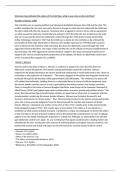Historians have debated the origins of the Cold War, what is your view on the Cold War?
Number of words: 3,888
The Cold War was an ongoing political and ideological battlefield between the USSR and the USA. This
conflict escalated into an arms race and a division in Europe in which the East sided with the USSR and
the West sided with the USA. However, historians have struggled to come to terms with an agreement
on what caused the Cold War. Martin Sherwin argued in 1973 that the USA was to blame for the Cold
War as he assessed the desire for diplomatic control through the 1943 atomic-energy partnership.
Arthur Schlesinger claimed in 1967 that the USSR was to blame for the Cold War as he criticised the
personality of Stalin after World War II. Whereas John Gaddis expressed in 1996 that both countries
were to blame for the Cold War while examining the desire for diplomatic control through the 1946
rigged East German Elections. The origin of the Cold War lies on the official communist establishment in
East Germany, the 1946 rigged East German elections. Gaddis is the most convincing historian as he
supports this view by examining both perspectives of the debate, the desire for diplomatic control and
writes in a period that supports his credibility.
Martin J. Sherwin
Sherwin utilises the diary of Henry L. Stimson as evidence to support his claim that the desire for
diplomatic control through the 1943 atomic-energy partnership caused the Cold War. Stimson
emphasises the global dominance the atomic bomb had stating that it would either lead to the “doom of
civilisation or the perfection of civilisation”.1 The bombs dropped on Hiroshima and Nagasaki which were
produced through the partnership, killed approximately 200,000 people. 2 This reinforces the power the
USA yielded internationally, building them as a substantial threat in terms of military equipment since
the atomic bombs could be used as a tool to gain political and military power over foreign countries.
There is strength in this claim as General Douglas MacArthur took charge of the Supreme Command of
Allied Powers (SCAP) and helped Japan with remilitarisation, economic growth and political reform. 3 This
shows that the partnership restored foreign relations as Japan had no choice but to cooperate with this
transformation, reinforcing the atomic bombs influence. Stimson was President Roosevelt’s and
Truman's chief advisor on atomic policy.4 Thus, Stimson being involved in the atomic-energy partnership
gives him a more accurate judgement since he had witnessed the creation and research of atomic
bombs. Stimson's statement was written on the 31st of May 1945 5, months prior to the atomic bombs
being dropped in August 1945.6 This reveals signs of uncertainty in his claim as it was based on a
prediction of what could eventually transpire. A prediction is simply too inadequate to dissect the origins
of the Cold War as its lack of factual evidence of how the partnership evolved leaves no room to debate
against or for this belief, bringing this argument to a dead end. Although, as stated before the USA did
gain diplomatic control over Japan. So, any existing fear that Japan would become a leading nation was
alleviated by the USA, making the USAs chances of achieving global sovereignty increase. However, this
partnership started and ended with Japan as the USA had never used the atomic bomb to control
1
(Sherwin,1973, Pg965)
2
(History.com Editors,2009)
3
(Office of the historian, n.d)
4
(The editors of enclyopaedia Britannica, 2023)
5
(Sherwin, 1973, Pg965)
6
(Britannica, The Editors of Encyclopaedia, 2023)




